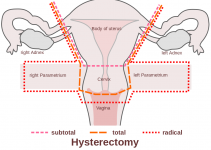 For years you experienced a regular period cycle that gave you a fairly predictable sense of what you were to experience every month.
For years you experienced a regular period cycle that gave you a fairly predictable sense of what you were to experience every month.
This doesn’t include just the timing of your period, but also what your period is like, heavy, light, somewhere in between.
No matter what the case, it has been Mother Nature’s way of telling you hey, you’re not pregnant every 28 or so days. While it’s an annoyance for some, others it’s a comfort, knowing that whatever method of contraception using, is working.
However, somewhere in your mid to late ’40s (however it can be sooner or later depending on your body itself [1]), your entire menstrual cycle is subject to change, stemming from fluctuations in hormones that can alter your period and its symptoms drastically.
These hormonal changes are occurring even while you are still seeing a “normal” period, so it could be difficult to determine that a change is happening, however, once it does, this means you are entering perimenopause (we’ll go into that next).
Your period can be a hassle to deal with, especially with unexpected changes underway. Knowing what to expect when you reach that timeframe in your life can help ease the worry and concern over irregular and erratic period behavior.
Let’s look at what exactly perimenopause is and how it can and will most likely affect you (however, everybody is different and can experience all or only some of the symptoms described below).
Why Does Your Menstrual Cycle Change at 40?
Women’s menstrual cycles change in response to a change in the levels of progesterone and estrogen. This is the beginning of the end of a woman’s fertile years.
These two hormones are responsible for controlling the menstrual cycle and its regularity for that matter. Once they start changing, so does your cycle.
These changes are known as the transition or perimenopause, which can manifest itself in multiple ways and varying degrees of symptoms.
Some women go through it without noticing much other than a change in their cycle, however, others will experience a wide range of symptoms.
What is Perimenopause?
Perimenopause is the transition period in which the normal menstrual cycle begins to change in its frequency and duration.
This period lasts until menopause, the final stage in which you reach after 12 months of no existing period cycle. This occurs during a woman’s mid to late ’40s (however as stated above can occur earlier or later depending on the person).
What is happening is that the ovaries are producing less estrogen due depleting follicle count.[2] These changes and the transitional period can last anywhere from one to 10 years before menopause[3] (when you officially have no more menstrual cycles).
The symptoms that you experience during perimenopause may be a gradual onset can often mimic PMS, but are a culprit of the fluctuation of progesterone and estrogen levels as the ovaries begin to prepare for menopause.
Symptoms of Perimenopause
As stated earlier, there are a wide variety of symptoms that women can experience during this timeframe which are indicators of Perimenopause. Let’s go into some of the symptoms so you know what to expect.
Your PMS Could Get Worse
Unfortunately for some, there could be an increase in the severity of PMS symptoms. This is usually one of the first things to notice because they are reported more during the early stages of perimenopause[4] and happen when the period is still coming regularly.
These could include increase tenderness in the breasts, more water retention, and stronger mood swings. These symptoms will eventually subside, when menopause is reached, so it’s not something you will have to deal with forever.
Changes in your Cycle
Multiple things can change when it comes to your actual cycle. One thing that you might notice is that the actual period might end up being shorter than it normally was, sometimes by two to three days.[5]
But that could also come with your period coming sooner than your average 28 days (or whatever your usual cycle is like).
Not only could you have shorter cycles you could also miss periods as well and have them every few months (and the last two weeks instead of days)[6] but this is something that is normal during this timeframe even though it makes predicting your next flow a lot more difficult.
And remember, during this timeframe you can still get pregnant because when you have your period that means that you ovulated about 14 days prior to that, so keep this in mind.[7]
Heavier periods are common during this time. Some women do report that their period does get heavier. This could lead to some issues if you are losing too much blood during your period.
If you notice that you are weaker than normal during your period, or if you are lightheaded or feel faint when you stand up, then contact your doctor to discuss your options.
There are a couple of reasons for heavy bleeding such as a hormone imbalance, polyps, and fibroids.[8] These are things that your doctor can determine.
Additional Symptoms
While these are some of the more pertinent symptoms that you might experience there are also others. Two of them being the ones that women talk about the most, hot flashes and night sweats.
Have you ever sat with someone who is hot and they say I’m having a hot flash? They are experiencing a shift in hormones that are affecting them and causing them to be warmer than normal.
You could also experience other symptoms that you might not consider significant such as weight gain, headaches, concentration problems, difficulty remembering things and concentrating, mood changes, decrease in the sex drive (so disappointing), and even an increase in UTI ’s.[9]
Your Age is not and Should Not be a Determining Factor
The reason for this is that many times, women’s symptoms when it comes to perimenopause if they haven’t hit that specific age (whatever that may be) are widely disregarded as symptoms of perimenopause.
If you are having symptoms such as hot flashes, night sweats, etc., ask your doctor to check your hormones, as it may be signs of a transition.
Abnormal Symptoms
While having changes in your period is normal, heavier or lighter periods, closer together or further apart, you also have to consider that there could be additional things going on with your body that might warrant a trip to the doctor.
Hormonal fluctuations will cause changes but there are potentially other issues that could be going on that you might be dealing with as well.
Polyps and fibroids are some things that could be a factor when it comes to abnormal bleeding. These are growths that can occur in the uterus and/or cervix.[10]
There is also endometrial atrophy and hyperplasia which is the thinning and the thickening of the uterine lining respectively.[11] Uterine cancer is also another potential issue only diagnosed by a doctor.
What is Menopause?
Menopause occurs in women after the perimenopause stage. Menopause is characterized by the absence of a menstrual period for 12 straight months and generally occurs when the woman has reached roughly 51 years of age[12] (again, however, this could be different either earlier or later for different women and age is a terrible indicator of menopause).
The average age of menopause is 51, although it can occur in your 40s and can even begin as early as your 30s. Menopause typically occurs between the ages of 45 and 55. As a result of menopause, women will stop getting their monthly period and will become unable to get pregnant.
While menstrual changes are common for women in their 40s, there are other changes that may be the result of another condition; some of which were discussed earlier.
Final Thoughts
Remember, you don’t have to suffer alone with this, there are plenty of options for alleviating your symptoms of perimenopause that you might want to discuss with your doctor.
While you can still get pregnant during perimenopause, the likelihood is declining (once you reach menopause you are no longer fertile).
So while you might consider this the perfect time to go off birth control or stop using some form of protection, it’s imperative that you continue, especially if you don’t want to grow your family at this time.
During perimenopause, there are also plenty of options to help get through this phase without having to suffer from the symptoms.
There are hormone therapies, birth control, and other methods, to help you manage the symptoms. If you are having symptoms that you cannot handle or that are affecting your daily life, speak with your doctor to get some help.
References
- What to Expect in Perimenopause. [Link]
- Stephanie Watson & Atiya Hasan. Can Perimenopause Cause Your Periods to Be Closer Together? [Link]
- See Above #1
- See Above #1
- See Above #1
- Gina Roberts-Grey. Pinpointing the Signs of Perimenopause. [Link]
- Ashley Mateo. 8 Ways Your Period Changes When you Reach 40. [Link]
- See Above #1
- See Above #2
- See Above #2
- See Above #2
- Salynn Boyles. Cycle Changes Predict Transition to Menopause. [Link]



Hello!
I am 43 and my period is more regular than any other time in my life. It comes every 28 days like clockwork, and lasts 4-5 days. Is this indicative of fertility? Or is my body finally getting itself together years after struggling with fertility.
Hello Bibi, the healthy period that is coming on time is surely an indicator of fertility and I think that you should work on the baby if you want to have one.
I am 50 and I still have heavy cycles.
Hi Lee, maybe you will reach menopause later than others. Unless that is you haven’t always had heavy cycles. If they are changing and becoming heavier it could be perimenopause that you are experiencing. If you are bothered by them or want to be sure, make an appointment with your doctor and have them check your hormone levels.
I am 40 going on 41 my periods are shorter and further apart sometimes skipping what’s going on
Hi Sherry, it’s that time. You are most likely in perimenopause, which means soon you will be or cold be experiencing other symptoms such as hot flashes, night sweats, etc. If you are concerned by any of your symptoms, please see your doctor as they can check your hormones.
Thank you for the informative article. I’m 47 and until I turned 46 my period was 25 days and worked like a clock, with mid intensity flow lasting 5-7 days. When I turned 46, my period shortened to 22-23 days with no apparent difference in flow. This month, it shorted to 20 days. My last flow was notably longer (10 days) and had some clotting at the end. But not heavier. I assume that this is fairly normal after reading your article. I do not tolerate hormonal therapy or contraceptives so I’m completely “clean” so to speak.
Hi my period during the last three months from the time one ends to the next one begins are 18 days apart is that normal? They have been very heavy and some clotting. I will be 43 this month.
Hello Darla, has this always been the case for you? Since when has this started to happen?
It’s been a month now, my period is on and off light, heavy and spotting after sex. For the last week continious bleeding. Last January, I had a polyp removed, I thought the bleeding will stop. Tried birth control pill, IUD but still bleeding. Checked my hormones level they ok.
Doctor advice remove my ovary. Should I do it?
Hi there Emma, get a second opinion from a doctor after physical assessment and examination (blood tests, etc.).
I am in my 40s, do periods stop for good?
Hi Gemma, it depends on when you go through menopause. Once you completely go through menopause then yes you will no longer have a period because you will no longer be ovulating.
Hi I just turned 41 last Thursday. Today I wake up and saw so blood in toilet with a tiny clot. I never had a normal period in my life. This is first time in over a year that I have seen blood
Hi there Victoria, since this is unusual for you, then I would advise that you go and see your doctor about this issue.
Hi, I’m 40 with 4 kids, last pregnancy 11 years ago. My period this month is on time but I am bleeding heavily and many large (bigger than a quarter) clots.
Should I be worried?
Thanks in advance
Hello Trenece, I would advise that you see your doctor about this change in your period.
I will be 43 in 2 month,
My last period is was very light and lasted for
A whole month .i took contraceptive for one month and I saw my period lasted only one day and gone.
Now for these month 4 days passed
Is it Is it normal
Hi Ekram, it’s quite possible that you are pre-menopausal or actually going through menopause, unless of course you are pregnant (because until you are officially through menopause it’s always possible. You can always make an appointment with your doctor to get you hormone levels checked and see where you officially stand.
I’m about to be 43…my menstrual is light enough to wear just a liner lasting 4-5 days…it doesn’t really come down unless I use the rest room…recently my menstrual starting coming 2 or 3 weeks apart…also experienced insomnia and ocassional hot flashes…this all happening in the last month in a half or so
Hi Monique, sounds like symptoms of perimenopause. I would make an appointment and have them test your hormones, determine where you stand.
My period is now at 24 days instead of 28 and last 5 to 6 days when it used to last 4 and we’re very light. Now I am bleeding very heavy with lots of blood clots and bad cramps. I am turning 43 this month. Is this normal?
Hello Shelley, no this is not normal. I would advise you to see your doctor as soon as you can.
Hi, I had my last child in 2006, via cesarean section, when I went back for a renewal of my family planning exercise, d nurse tried all she could but she couldn’t make d implantation, she said something was blocking d path n as such she could not insert d iud(coil) n for seven years after I was having regular sex but I never got pregnant, but in d last five years I didn’t have sex until very recently n we didn’t use protection. My period has been erratic lately, n this year, it has only come twice, in January n then in July. My concern is, am I likely to get pregnant?
Hello Eme, you need to see a doctor re what has been preventing the nurse inserting the contraceptive. Based on all this you will know what the likelihood is of you getting pregnant.
I’m 41 and my period last for 12 days with clots.
I am 42 years old and my menstruation period is 5-7 days. When bleeding occurs its painful for me.
Hi there Vinita, please read the link below:
https://womanjunction.com/how-to-cope-with-painful-menstruation/
I’m 41 years old and my period last only 2 days and is very light ,
Lucky you!